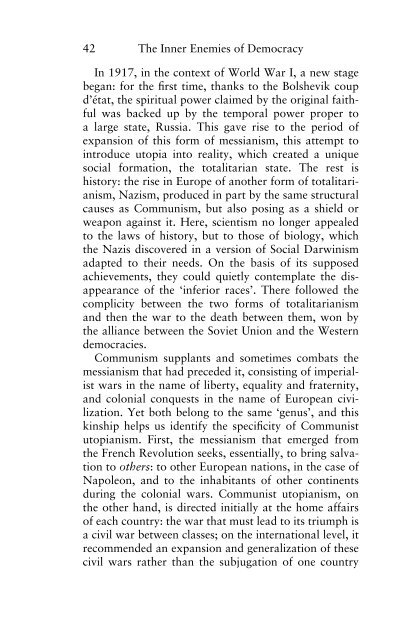0745685749 enemies democracy
You also want an ePaper? Increase the reach of your titles
YUMPU automatically turns print PDFs into web optimized ePapers that Google loves.
42 The Inner Enemies of Democracy<br />
In 1917, in the context of World War I, a new stage<br />
began: for the first time, thanks to the Bolshevik coup<br />
d’état, the spiritual power claimed by the original faithful<br />
was backed up by the temporal power proper to<br />
a large state, Russia. This gave rise to the period of<br />
expansion of this form of messianism, this attempt to<br />
introduce utopia into reality, which created a unique<br />
social formation, the totalitarian state. The rest is<br />
history: the rise in Europe of another form of totalitarianism,<br />
Nazism, produced in part by the same structural<br />
causes as Communism, but also posing as a shield or<br />
weapon against it. Here, scientism no longer appealed<br />
to the laws of history, but to those of biology, which<br />
the Nazis discovered in a version of Social Darwinism<br />
adapted to their needs. On the basis of its supposed<br />
achievements, they could quietly contemplate the disappearance<br />
of the ‘inferior races’. There followed the<br />
complicity between the two forms of totalitarianism<br />
and then the war to the death between them, won by<br />
the alliance between the Soviet Union and the Western<br />
democracies.<br />
Communism supplants and sometimes combats the<br />
messianism that had preceded it, consisting of imperialist<br />
wars in the name of liberty, equality and fraternity,<br />
and colonial conquests in the name of European civilization.<br />
Yet both belong to the same ‘genus’, and this<br />
kinship helps us identify the specificity of Communist<br />
utopianism. First, the messianism that emerged from<br />
the French Revolution seeks, essentially, to bring salvation<br />
to others: to other European nations, in the case of<br />
Napoleon, and to the inhabitants of other continents<br />
during the colonial wars. Communist utopianism, on<br />
the other hand, is directed initially at the home affairs<br />
of each country: the war that must lead to its triumph is<br />
a civil war between classes; on the international level, it<br />
recommended an expansion and generalization of these<br />
civil wars rather than the subjugation of one country













